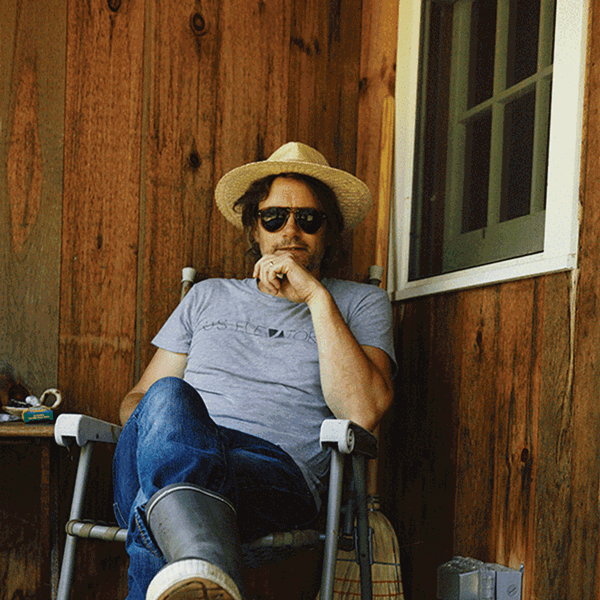It's a boiling 86 degrees in the Berkshires hamlet of Washington, Massachusetts, and Johnny Irion needs to hit the road. But first there's this interview—and about half a football field of overgrown lawn that needs to be mowed. It's the latter that's consuming him when your music editor and photographer roll up. "Okay, I'm ready," jokes the sweaty, shirtless singer-songwriter as he stomps over to meet us. "You guys wanted to get some shots of me looking like this, right?"
After changing into dry duds and grabbing an iced tea, Irion sits down in the shade and explains how he's going a little nuts. He's about to drive three days straight to Santa Barbara, California, where he and his wife and musical partner, singer Sarah Lee Guthrie, have a second home; their daughters Olivia, 13, and Sophia, 8, will be starting their first years of West Coast school and the house there needs to be prepared for the family. But first this one needs to be battened down for the winter. And then there's the matter of the upcoming first tour by Irion's new band, U.S. Elevator.
If he looks a bit like a Grapes of Wrath farm worker in his straw hat and three-day stubble, it certainly fits this day of toil. The analogy is related, so to speak, in another way: Irion is the great-nephew of John Steinbeck, as his aunt married the legendary novelist's son, Thomas Steinbeck (also an author), in 1994. "I was aware that it was a big deal when they got married, but I hadn't really read any John Steinbeck then," says Irion, who grew up in Durham, North Carolina. "Now he's one of my favorite writers. But in high school his books were part of the stuff that was forced upon us, so that had made me resistant to reading them. In 1984, Durham was a weird place to be if you were a snotty kid with a skateboard who listened to Black Flag, the Dead Kennedys, and Minor Threat." Prior to his rebellious teen hardcore years, it was the Beach Boys and the Beatles that had initially transfixed him. "I remember looking at the poster in the White Album while I was listening to it at my aunt's house, memorizing all [the Beatles'] names," he says.
When he was 21, Irion's dual loves of Brian Wilson- and Lennon/McCartney/Harrison-inspired melodies and aggressive punk came together in his first band, the pop-grunge group Queen Sarah Saturday. In the 1990s the Raleigh-Durham-Chapel Hill Triangle attracted a lot of label love as an alt-rock hot zone, and it wasn't long before the quartet was picked up by major indie Thirsty Ear. Despite the attention garnered when "Seems," a song from Queen Sarah Saturday's first album, Weave, was featured in the hit 1995 film Empire Records, the band was quickly dropped from their label and broke up not long after. Irion jumped to another local buzz band, Dillon Fence, for a European tour supporting the Black Crowes. Although that group as well would soon get dropped and split up, during the tour Irion befriended Crowes front man Chris Robinson, who encouraged him to move to Los Angeles. "That's where Chris lived and he was producing this band from Monterey called the Freight Train," says Irion. "They needed a guitar player and I wanted to move to L.A., so in 1997 I went out there." Unfortunately, in yet another crash-and-burn story, the Freight Train went off the rails not long after Irion's arrival. But the move would prove fruitful in a different way.
Through his fellow Southern singer Robinson, the North Carolinian met his future wife and collaborator, who is the Western Massachusetts-reared daughter of folk great Arlo Guthrie and the granddaughter of American musical icon Woody Guthrie. "We started hanging out and playing together, and listening to stuff like Graham Parsons, the Byrds, and David Crosby's [1971 Atlantic Records album] If I Could Only Remember My Name," recalls Irion. "The first song we sang together was [Parsons and Emmylou Harris's version of the country classic] 'Sleepless Nights,' which sounded really good. It's a hard song to sing, so I figured, 'Wow, if we've got this one down already there's definitely something here.'" Surprisingly, Guthrie credits Irion, and not her father, with motivating her to perform. "I was kind of a punk rock chick—I didn't wanna follow in my dad's footsteps, like I thought people expected me to," says one of the heirs to America's best-known folk dynasty. "But all of sudden Johnny and I were singing Flying Burrito Brothers songs, he taught me some chords on guitar, and the next thing I knew was singing Cisco Houston songs with my dad and my brother [Abe Guthrie]. It felt right. As a songwriter Johnny works really hard at crafting his songs. Sometimes he'll be up at 3am, writing and making demos. I tend to be kind of lazy and picky about my writing, and he always pushes me to do more."















